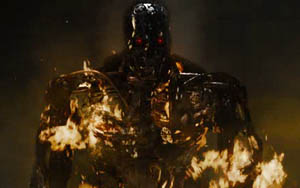|
Would that the title actually referred to the franchise. Alas, such is not the case. James Cameron declared the story finished with T2, and I pretty much agree. 
This is not to say that a sequel or sequels could not be entertaining or add to the story as a whole, but so far, they've fallen short. With Rise of the Machines, we got a rehash of the first two films with a lot more camp and pretty much one actual contribution to the mythos: the beginning of the war with the machines and the promise of finally seeing a post-Judgement Day scenario featuring the guerilla war shown in brief glimpses in parts one and two. Terminator Salvation gets it right in the sense of finally not being a sequel that shamelessly reuses the plot structure of the original Terminator, but gets it wrong in the sense that, like its immediate predecessor, it's a big case of spinning wheels. It begins in the midst of the man versus machine war, and ends in the midst of the man versus machine war. One could uncharitably say-like I'm about to-that it's a big, expensive, noisesome two hours of nothing actually happening. As the story begins, the nuclear war has come and gone, and the survivors struggle through the aftermath. Future savior of mankind John Connor is rising up through the ranks of the resistance, periodically broadcasting messages of hope to anyone who's alive to hear them. Meanwhile, a convicted murderer named Marcus who, in the pre-title sequence, sold his body to Cyberdyne before his execution, suddenly finds himself in this post-apocalyptic world, beset by killer machines, with no idea of how he's arrived in this situation. A teenaged fighter named Kyle Reese, whom we all know will one day father John Connor via some wacky time travel hijinks, saves Marcus, only to be captured and taken to a detention camp along with dozens of other survivors hiding out in the wastes. Connor's commanding officer believes they have a chance to smash the computer system utilizing some new intel, but after Connor learns from Marcus of Kyle's capture, he determines to first rescue the survivors at any cost in order to protect the recursive time pathway that caused his own existence, and which he believes will eventually guarantee a human victory. What's most frustrating here is that the overall idea, while feeling annoyingly like a story designed to wedge in between points A and B without disturbing anything along the way, is perfectly fine and could have been made into a good film. But the script feels as though it was sprayed with buckshot, and has dozens of little holes some good script doctoring could have patched up before the cameras started rolling. The computer network Skynet has prioritized Connor and Reese as targets, without the film ever explaining how it could possibly know that either of them will end up being crucial to the war in its closing stages. None of the terminators that travelled back from the future survived to pass on that info before Skynet could have naturally learned it. And if they do know, why do they pass up several chances to simply do Kyle in rather than pointlessly holding him prisoner? One could cut out the entire idea of Skynet's apparent foreknowledge without affecting the plot at all. Why is the Arnold-style terminator encountered at the end harder to kill than the T-1000 from T2? Reese blew the same model in half with a homemade pipe bomb in film one. For that matter, why don't we see any real evidence of John Connor's supposed military genius? He makes gross errors in judgement that I, as a non-soldier, saw coming almost instantly. The film commits the writing sin of never giving us a compelling reason to care about John, other than that he's the hero from previous films in the series. We've never met this older, battle-hardened man before; where are the character scenes from Cameron's films that emphasized the essential humanity of his heroes? 
Salvation isn't all bad; in fact, compared to contemporaneous summer popcorn fare like Transformers 2 and GI Joe, it feels like a work of stunning competency. I'm glad director McG (whose ridiculous moniker still sounds like some McDonalds' brand of underwear or something) has backed off of his previous trend-o-rama Matrix-aping style, and has left the campiness of film three behind in favor of a story that actually feels serious in nature. The reappearance of the Arnold terminator was fun to see, (not to mention a seamlessly stellar piece of effects work; the people I've heard calling it fakey must be outright nuts), but even so, it indicates a fundamental problem with the film when the most memorable parts are ones that reference the original (which the dialogue needlessly continues to do, as well). And frankly, the ending is as downright cheesy as it is medically implausible, almost as implausible as that two-story robot that tiptoes up to an isolated desert shack without making so much as a creak. This film has a mantra, one of those phrases repeated ad nauseum throughout the film in order to indicate its thematic point. The offending phrase in this case is "second chance." I submit that this film was the series' second chance; if there is to be a fifth film, it had damn well better stop mucking about, quit stalling and deliver the goods. While the first two films had their flaws, they were well-made enough that the problems tended not to spring to mind until the film had finished. Here, they keep popping up and whispering while the show is still in progress, and linger in the mind long after the fine but forgettable plot elements have faded from thought. -review by Matt Murray
|
|
||||||||